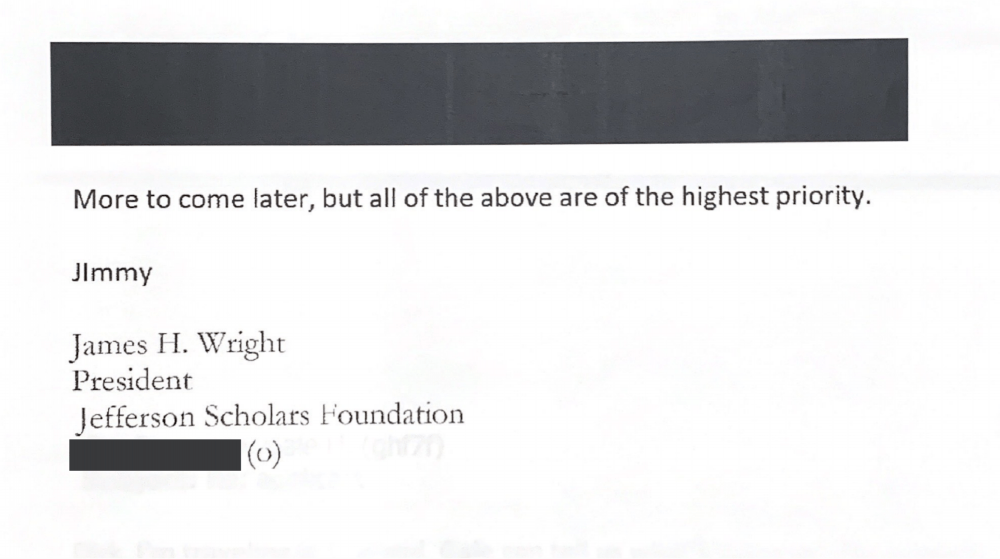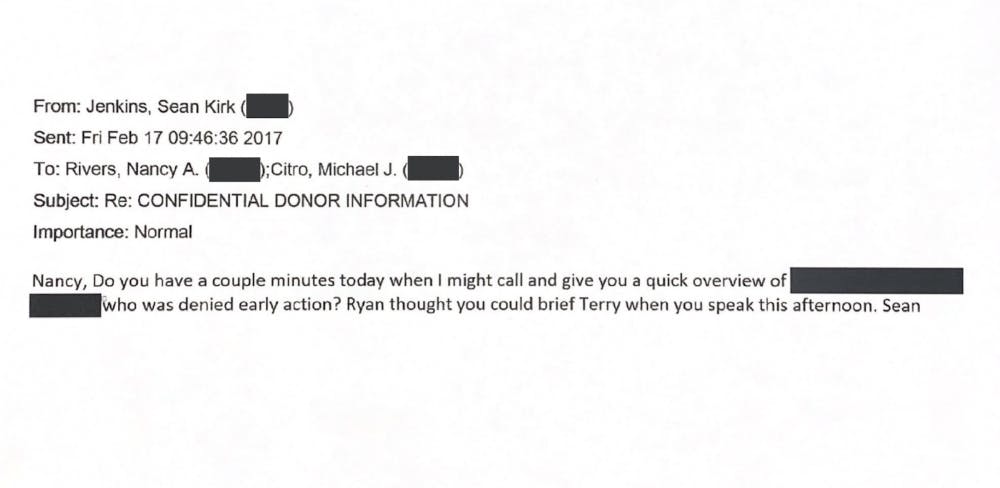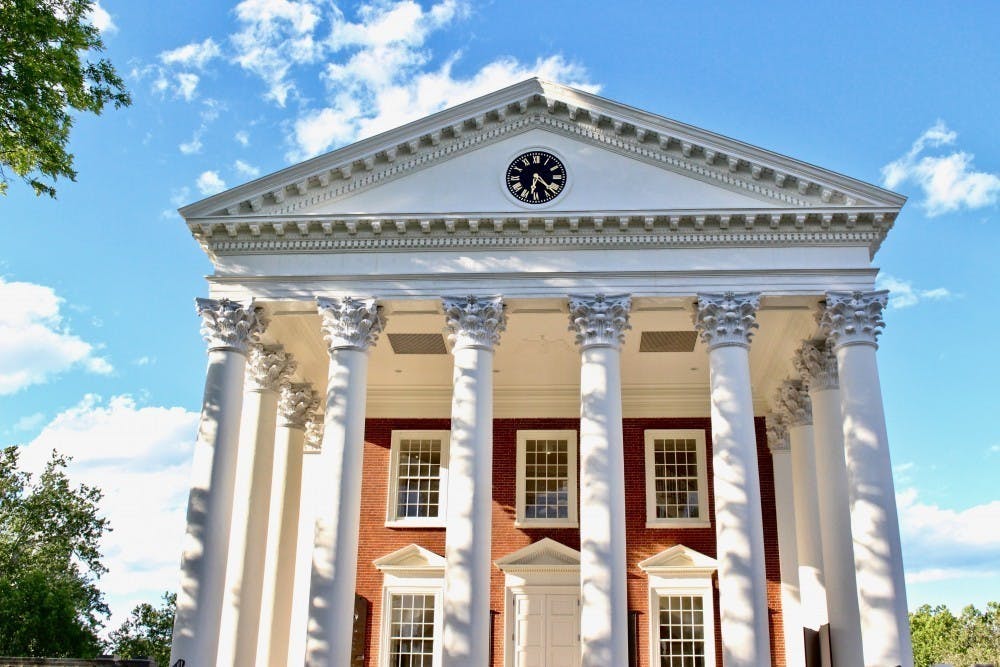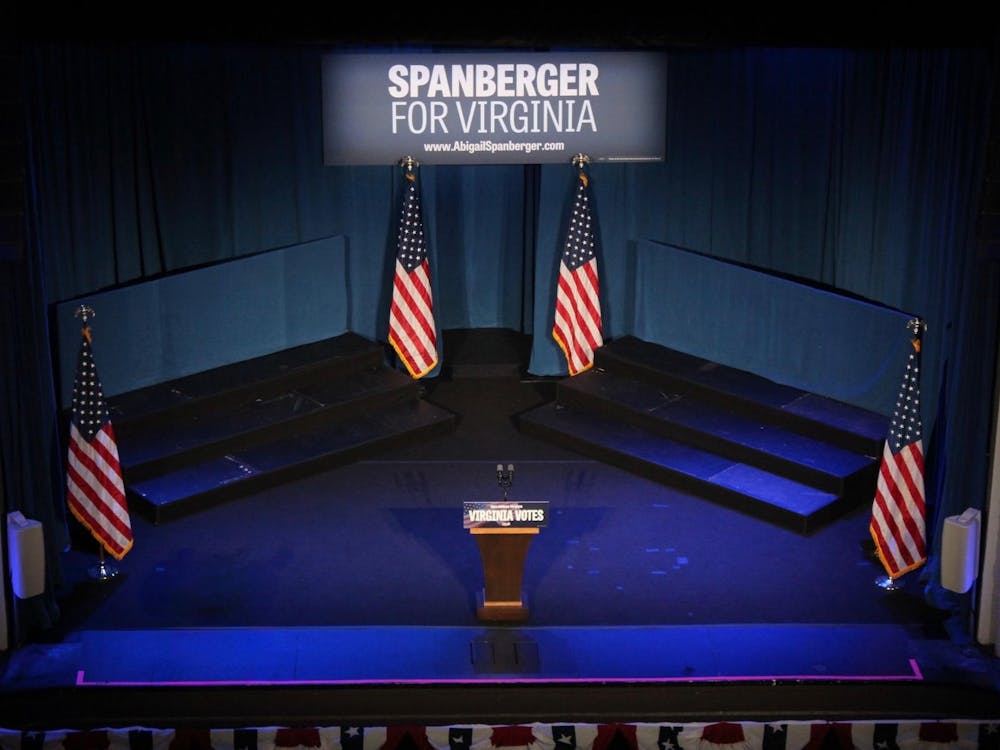The Cavalier Daily obtained emails between University officials, board members and donors that reveal the influence of the admissions watch list first publicized in 2017. For the last 20 years, the University has used a list to track certain applicants who receive an additional review — many of whom are connected to major donors.
The documents from 2010 through 2017 show that alumni, donors and friends of the University would write to officials such as Sean Jenkins, senior assistant to the President, on behalf of certain applicants. The University would then flag the applicants they deemed “high-priority” in the admissions cycle.
Former University spokesperson Anthony de Bruyn said in 2017 that admissions decisions were made entirely by admissions staff. He added that donors would contact the advancement office to recommend students, and the office would provide them updates on an applicant’s status. However, he said that the admissions and advancement offices do not have access to each other’s records.
“The Advancement Office does not determine whether an applicant is admitted,” Acting University Spokesperson Wes Hester said in an email statement today. “However, this practice allows development officers to serve as a buffer with those alumni, donors, and friends who have provided prospective student endorsements during the admission cycle,” confirming this practice still exists.
The emails reveal nearly a decade of coordination between personnel across offices. Jenkins served as the central liaison in communicating information between advancement and admissions personnel and individuals asking to flag certain applicants.
The documents show the links between the watch list and the admissions office — not only are borderline applicants on the list afforded a second review, but the emails reveal that the Dean of Admissions Greg Roberts received information about applicants on the list.
This process was “better than outside recommendation letters,” according to an email Jenkins sent. “I can ask the student for an interview, but more importantly we should put her on our watch list,” he said in another.
Several emails mentioned direct collaboration between Jenkins and Roberts over the status of flagged applicants. References to private, in-person meetings with Roberts are scattered throughout the documents, as are mentions of staff meetings between Jenkins, development officials and other administrators such as Dean Ian Baucom of the College.
Other emails describe potential strategies to push less-qualified applicants past the University’s threshold — which sometimes involved deferring and waitlisting applicants instead of denying them. Jenkins promised in one such email that he would review a particular applicant’s file with Roberts personally, but he worried “based on those scores a deferral then a waiting list might be best-case scenarios.”
According to 2019 admission statistics provided by Hester, 13 percent of applications from the total pool were waitlisted, while 43 percent of applicants from the watch list were waitlisted. Only eight students — seven percent of the watch list applicants — were offered admission, making the percentage of accepted watch list students only 0.08 percent of all total admission offers.
“Being on a list does not guarantee that an applicant will get in, as every student offered admission to U.Va. must be academically qualified to be here,” Hester said.
Hester also said if the advancement office knows of a prospective donor with a family member in the applicant pool, the University will suspend gift conversations during the admissions cycle.
The emails show that some prospective students would be flagged before they even applied to the University. Locke Ogens, who at the time was chief of staff for external relations at the Darden School Foundation, emailed Jenkins in 2013 on behalf of an applicant whose alumna mother was “very engaged at Darden.”
“Leonard, Greg, and I met about this one two years ago,” Jenkins responded. “We’re on top of it.”

Ogens did not respond to a request for comment.
Requests to place applicants on the watch list often came from prominent figures in the University and Charlottesville communities. The documents reveal many high-profile individuals who emailed Jenkins on an applicant’s behalf, including novelist John Grisham, former Board of Visitors member Georgia Willis Fauber and former University President John T. Casteen III.
In an email titled “RE: Pat Lampkin suggested I be in touch with you” from April 1, 2013, Jenkins responds to an individual whose name is redacted, saying that he is delighted to learn of a particular applicant’s interest in the University, “especially given the long legacy of family ties!” Patricia Lampkin is the University’s vice president and chief student affairs officer.
Other requests came from people publicly affiliated with the University’s donors. In one email exchange, James Wright, president of the Jefferson Scholars Foundation, wrote to Jenkins, “Below is a preliminary list of applicants who are critically important to the Foundation and the University…. More to come later, but all of the above are of the highest priority.”

University officials also corresponded about the status of “high-priority” applicants who had already been denied admission, and this practice appears to have occasionally involved former President Teresa Sullivan. In a 2017 email titled “Re: CONFIDENTIAL DONOR INFORMATION,” Jenkins asked Nancy Rivers, chief of staff under President Sullivan, if they could discuss an applicant who was denied early action, so that Rivers could brief Sullivan on the situation when they spoke later.

Because the digital correspondence of the administrative staff of public universities are subject to Freedom of Information Act requests, Jenkins made it a practice to talk with University personnel about the watch list in person instead. In one email, he wrote, “Because of FOIA requests I look forward to more in person.”
The emails also show that University officials thoroughly research the families of certain applicants and accepted students. Emails between Jenkins and Ryan Emanuel, a strategy manager in the development office, discuss the family of a newly admitted high-priority student whose father died after a “high-profile contentious divorce.”
“This is all helpful and interesting background,” Jenkins said. “Just let me know how I might begin a relationship with the student and family as they enter the fold.”
The vetting of certain applicants’ families could also result in an applicant not meeting the standards required of a “high-priority” flag. In an email exchange between Jenkins and Dirk Katstra, executive director of the Virginia Athletics Foundation, Jenkins tells Katstra that a certain applicant’s name “is unfamiliar to me, which in and of itself speaks to the priority.”
Jeff Thomas, an author based in Richmond, obtained these documents through a FOIA request when researching for his new book “The Virginia Way: Democracy and Power,” published in July 2019. He gave these documents to The Cavalier Daily. Thomas obtained the original documents regarding the watch list through a FOIA request in 2017.
Some of the obtained emails are dated in the spring of 2017, just after the watch list was publicized. In one email from April 25, 2017, Jenkins tells Tyler Blue, a member of the Advisory Board for the Jefferson Scholars Foundation, that in the fallout of the articles he has “stayed away from Greg [Roberts].” In another, William Tyson, a member of several University boards, thanked Jenkins for checking in on an applicant sitting on the waitlist and dismissed the significance of The Washington Post's reporting.

After the watch list was first publicized in 2017, Student Council conducted an investigation but found no evidence of admissions decisions being changed as a result of donations to the University. Data obtained by The Cavalier Daily shows that the watch list was used as recently as last year. Hester said 110 applicants were on the watch list during the 2018-2019 admissions cycle — an increase from the 59 students reportedly tracked during the 2016-2017 admissions cycle.
“Our aim is to recruit an exceptionally talented, diverse, resilient and service-oriented group of students, regardless of their economic circumstances,” Hester said. “That will continue to be our focus going forward, and we encourage anyone to recommend any prospective student that they feel would be a good fit at UVA.”
Correction: Hester said, "The number of applicants receiving an additional review who were offered admission represents approximately 0.0008 percent of all total admission offers" in the 2018-19 admissions cycle. However, The Cavalier Daily calculated the percent of watch list applicants offered admission to be 0.08 percent of total admission offers based on the statistics given. The article has been updated with the correct percentage.







